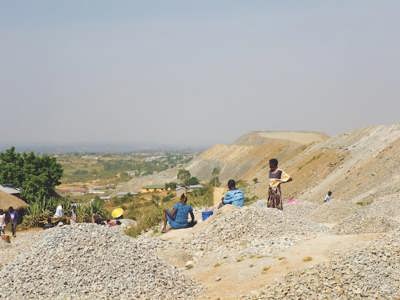
Human rights and the ‘just transition’ in the new scramble for Africa
Walker Syachalinga examines how indigenous people’s rights and land can be protected in the race for Africa’s critical minerals.
Posted on 24 July 2024
As the world transitions to green and climate-friendly energy (the just transition), a new scramble for Africa’s critical minerals is playing out in the Democratic Republic of Congo (DRC) and Zambia with significant implications for communities being resettled for new mining projects.
The race between the US and China
The US and China are in a race to secure critical minerals which are essential to the just transition. The urgency of that race is reflected in the fact that electric cars are projected to account for 45.3% of the global light-vehicle market by 2030. To meet that and other demands, it has been reported that “the world would need between 35 and 194 large new mines for copper alone through 2050. That translates to between one and six new copper mines, every year”.
Through the Executive Order on America’s Supply Chains the US has resolved to secure critical minerals and their supply chains, describing the minerals as “essential to the economic and national security of the United States”. To do so, the US is investing $2.3 billion in the Lobito Corridor, a colonial era railway line running from Angola’s Atlantic coast to Zambia’s Copperbelt via the DRC. The US says its reasons for investing in the railway line is so that “strategic minerals such as copper, cobalt and lithium from the DRC and Zambia will now be exported more efficiently to global markets.”
For its part, China’s Belt and Road Initiative aims to connect countries around the world through trade routes leading back to China. To rival the US funded route, China is funding the Dar es Salaam Corridor or Tazara, a route which runs from Zambia’s Copperbelt to the Tanzanian port city of Dar-es-Salaam. Refurbishment of this route will attract funding of $1bn from China and is intended to facilitate the swift transfer of critical minerals to eastern markets via the Indian Ocean.
At what cost?
The impact of this global attention on the DRC and Zambia is being felt on the ground with fears of land encroachment and displacement of people from their land. In Zambia, one of the biggest copper deposits was discovered recently sitting above the village of Kawama. To get to the copper a geologist leading the discovery blithely remarked that “for a find this valuable, there’s nothing on the surface we can’t move”.
Across the border in the DRC, Amnesty International has reported of forced evictions of entire communities from their homes and farmland in a bid by multinational companies to expand industrial mining of cobalt and copper.
The impact of loss of land and involuntary resettlement on local communities are also documented in a report by Oxfam which notes that such resettlement occurs in “a setting characterised by poverty, rapid economic growth, limited regulatory capacity and intense pressure on land availability.”
Given widespread awareness of the impact of loss of land on local communities, institutions funding the race to secure critical minerals have highlighted the risks associated with loss of land.
The US’s International Development Finance Corporation, which is providing funding for the Lobito Corridor insists that borrowers conduct a “Land Acquisition and Resettlement Framework to address any economic or physical resettlement impacts that could arise as a result of the Project.”
The World Bank, which is funding efforts by the Zambian government to refurbish the Dar es Salaam Corridor foresees high risks “primarily due to land acquisition, involuntary resettlement impacts (including physical and economic displacement), and restrictions on land use.
Is there access to justice for communities impacted by the loss of land?
It is not uncommon for multinational companies involved in resettlement to refer to the International Finance Corporation’s Standard on Land Acquisition and Involuntary Resettlement. That standard means that that entities with access to funds from the IFC must compensate individuals impacted by physical displacement (relocation or loss of shelter) and economic displacement (loss of assets or access to assets that leads to loss of income sources or other means of livelihood).
Those sentiments are echoed in the Food and Agriculture Organisation’s Guiding Principles on Large Scale Land Based Investments as well as the United Nations Economic Commission for Africa’s Framework and Guidelines on Land Policy in Africa.
However, those standards and guidelines are not enforceable in domestic courts as they have not been enshrined into law. That means communities suffering losses due to being displaced, relocated or resettled by a multinational company cannot rely on international standards to enforce their rights.
It is not surprising therefore that as the world races towards securing critical minerals, instances of human rights abuses arising out of the loss of land are becoming common place. The Business and Human Rights Resource Centre reports an increase in cases brought against states and/or the private sector in transition mineral mining and three renewable energy sectors including in relation to the “abuse of Indigenous Peoples’ rights (55%), particularly the right to Free, Prior and Informed Consent (FPIC – 35% of cases).”
The absence of enforceable international standards or guidelines on loss of land emphasises the importance of access to justice for communities impacted by such losses. Leigh Day has a track record of acting for communities suffering from the impacts of the loss of land and representing communities adversely impacted by large scale mining projects. As the world races to secure critical minerals, it is hoped that communities harmed by mining and other projects will have access to justice when faced with large scale loss of land and environmental damage.

Walker Syachalinga
Walker is an associate solicitor in the international and groups claims department

London Bullion Market Association drops challenge to groundbreaking human rights claim proceeding in UK Court
London Bullion Market Association (LBMA) has withdrawn its jurisdiction challenge to a landmark human rights claim proceeding in the UK courts.

Brazilian quilombola communities sue UK mining company Brazil Iron for environmental damage
More than 100 residents from two quilombola communities (descendants of Afro-Brazilian slaves) in Bahia state in Brazil who filed proceedings in September 2023 against UK registered mining companies Brazil Iron Limited and Brazil Iron Trading Limited, have today filed details of their claim at the High Court in London.

